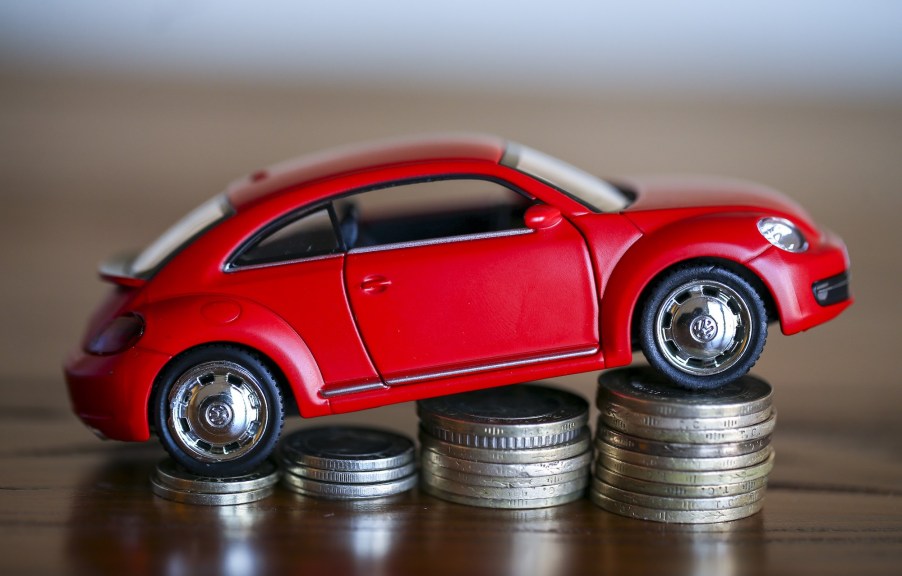
The Average Car Payment Makes Dave Ramsey Sick
For millions of Americans, auto loans have become givens in car buying. These loans are not only for new vehicles but also used ones. They include everything from subcompacts to SUVs and luxury cars. Auto loans cost most Americans more than 5 percent in interest.
Personal money management guru Dave Ramsey suggests the expense is ridiculous. He says there’s a better way to buy a car: Use cash.
Car-buying numbers, broken down
In 2019, the average new car loan amount was over $32,000. For used cars, the amount was about $20,000, according to PolicyAdvice. Altogether, Americans have roughly $1.18 trillion in outstanding auto loan debt.
Almost one in every three Americans pays on an auto loan, according to Statista. The interest rate for an auto loan is based on an individual’s (or a couple’s) credit score, the length of the loan, and the age of the vehicle to be financed, according to ValuePenguin. The national average rate on a new car is 5.27 percent on a 60-month loan.
According to Ramsey in a 2017 video, the average car payment was $501 per month. If an individual were to pay that amount from the age of 30 to 70 into a decent growth-stock mutual fund IRA, the amount accrued would be more than $5.6 million.
Who is Dave Ramsey, and what’s his advice?
Dave Ramsey has entered the 29th year of his eponymous radio show, where he shares his personal finance advice. You can watch segments on YouTube or listen to his podcast. His weekday radio show also airs on more than 600 affiliates nationwide and boasts more than 17 million listeners. And his YouTube account has more than 2 million subscribers.
The YouTube segment from 2017 in which Ramsey answered one listener’s questions about purchasing a new car is still insightful today. The caller and his wife were considering getting her a new car because she commuted to work for one hour each way. She was driving a 2001 Ford Mustang with about 200,000 miles on it.
The husband wanted to wait until they had saved enough money to pay for a new car in full. But the wife felt unsafe in the old Mustang and wanted a different car sooner. The couple had saved $7,000 above their emergency fund. Ramsey agreed with both. Seeing that she needed a new car, he suggested they purchase an improvement, and the $7,000 should afford her a needed upgrade.
“She can move up three to four times the car she is in now,” he said. However, he also strongly suggested the couple not take out a loan but rather work on saving more toward the car she would eventually like in the future.
Ramsey’s take on what you should spend on a car
“There is no possible way you should ever buy a car with a car payment,” he said. “I would ride a bicycle before I had a car with a car payment.”
But how? The answer is to work around making car payments. “Once car payments are taken off the table, other creative answers start coming up,” he said.
On his website, DaveRamsey.com, the author addressed a Twitter follower who’d asked how much of an individual’s net worth should be tied up in a car. Ramsey responded that, in general, all vehicles owned should not add up to more than half anyone’s annual income.
“Cars lose 70 percent of their value in the first four years,” he said. “When you turn $30,000 into $11,000, you need to be able to absorb that hit. That’s about $100 a week, by the way.”
There are some exceptions, but generally, you shouldn’t take out an auto loan for a vehicle way above what you can afford. Some people might require a loan because they need a vehicle at that moment. But the key is not to overbuy.
“The typical person says, ‘I want it, I want to buy it,’ and then scratch their head their whole life as to why they are broke,” Ramsey said. “They’re giving it all to stinkin’ Ford Motor Credit or Lexus or Toyota or Chrysler credit or whoever it is.”
Ramsey added in response to the follower’s question: “Car payments and big car purchases will make you broke and keep you broke.”


